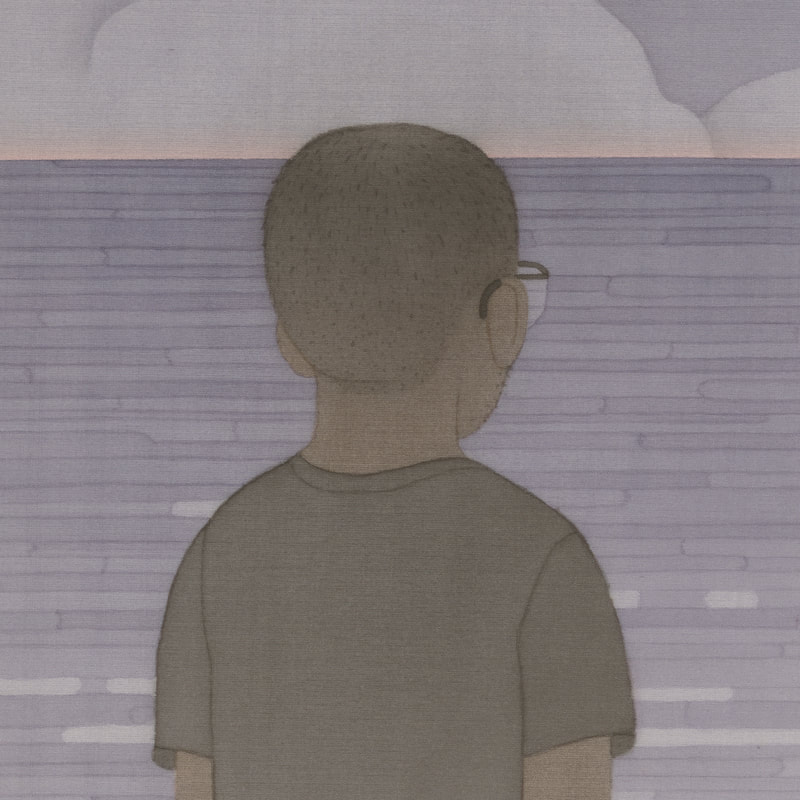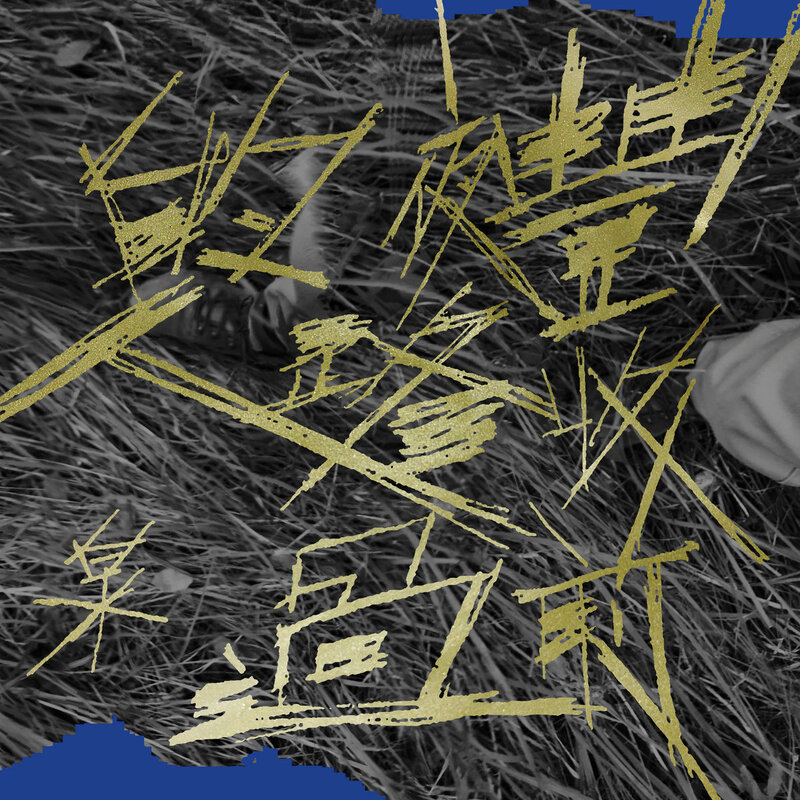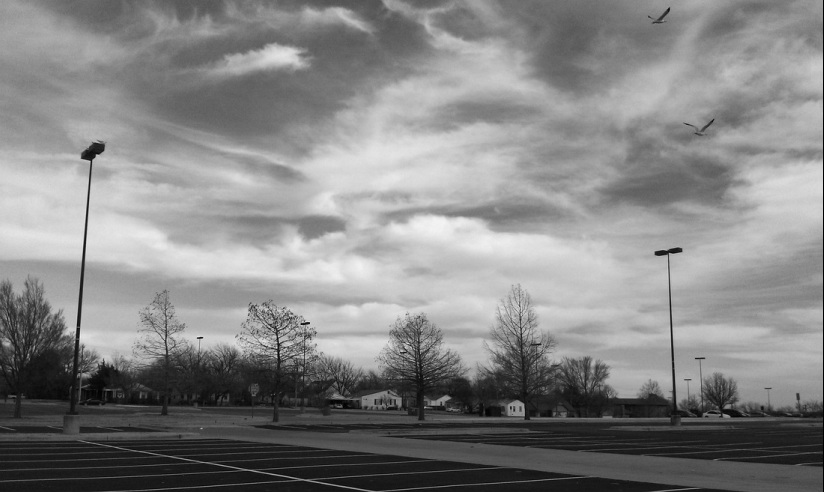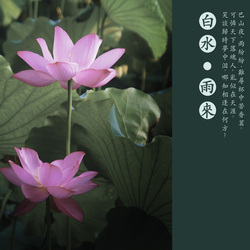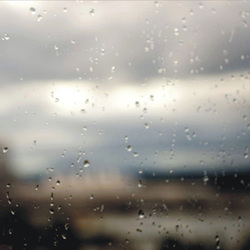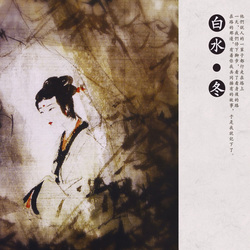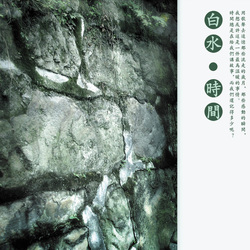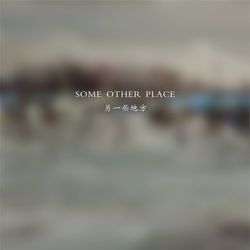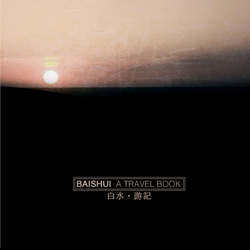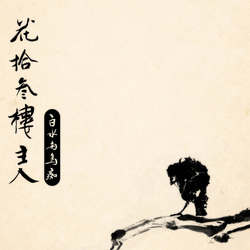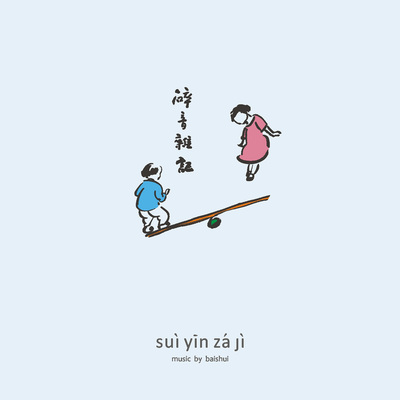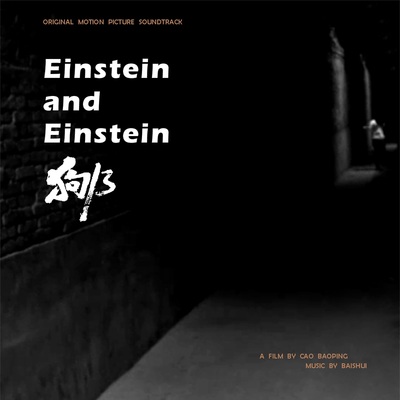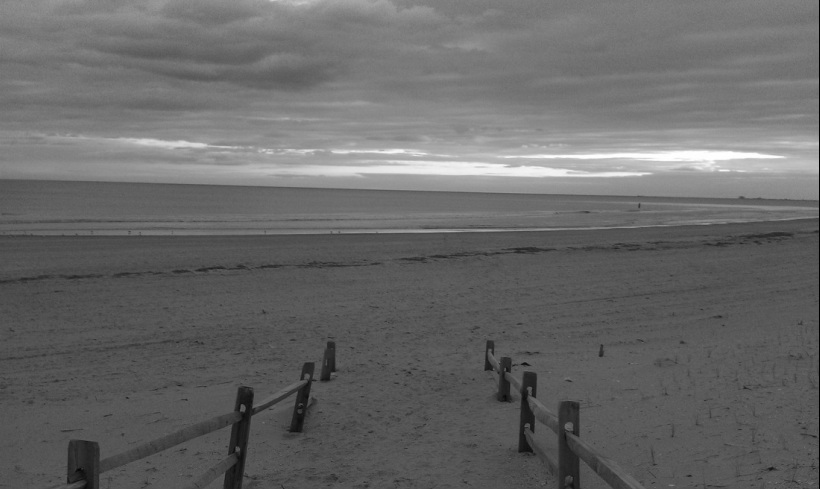The Long Goodbye
November 5, 2022
Eight Songs: That Passerby Is Killed
December 9, 2019
|
Baishui just released his 17th album Eight Songs: That Passerby Is Killed including two of his "folk suite" pieces "That Fisherman Is Dead" and "Three Songs".
Over a couple of years, we have seen a lot of sad stories happened somewhere. Although the names of the places you might have forgotten selectively, all of them made me depressed, helpless and distressed. I know as you could not betray the true feeling in your heart, so you began to write poems. I guess you also understand that this is an era they don't need any poetry and poets, it likes many of them don't think that we need real education and democracy. But, you still could not stop writing. Like me, I can not restrain my curiosity and desire to write those songs for you. Also, it is like them who cannot stop burning and destroying what you love. All songs written by Baishui Produced by Baishui Recorded by Jinliang "Tonee" Zhang & Baishui Vocals & Guitar by Baishui Trumpet by Matt Giella Cellos by Natasha Jaffe Violins by Jessie and Maria Mixed & Mastered by Jinliang "Tonee" Zhang Art Work by Wen Zhe |
Their Paradise
March 29, 2018
|
|
Sichuanese composer Baishui released his 16th album Their Paradise last month, it is a multi-faceted ambitious album that contains eight works were written with some of his letters and poems and essays.
Produced by Baishui Recorded & Edited by Baishui All the instruments by Baishui except trumpets (#3) by Matt Giella and cellos (#10) by Natasha Jaffe & Carolina Teruel Vocals by Baishui, Chunyang Yao as well as Yuan Tian Mixed & Mastered by Kevin Carafa & Jinliang "Tonee" Zhang Original Picture by Jiawen Design & Layout by Yuan Tian |
A Songbook for You
Dec 14, 2017
|
|
A Songbook for You was OUT, it is a set of recordings for 10th anniversary of Baishui's folk work album TIME. He performed his fourteen folk works with an acoustic guitar and recorded with a TASCAM handy recorder. You can listen and purchase it on Apple Music, Spotify, Amazon Music, Google Music and Bandcamp.
Produced by Baishui Recorded & Edited by Baishui Design & Layout by Yuan Tian |
My Town
July 15, 2017
|
|
My Town is the brand new field-recordings and sound-collage work by Sichuan composer Baishui. As he said, Time was a album for the fictional hometown, so My Town is a work he made for his real hometown. In past two years, Baishui recorded so many stereo sound tracks with his handy recorders and mobile phones around his town Yibin, which was a huge material library including a variety of different sounds and mood, such as the old, pure, dirty, vulgar, sincere and friendly. After that, the composer edited these materials to produce 10 new tracks by electronic way. Baishui named these tracks, and wrote poems for each one, took photos for each one, so what we are listening is more than a music work. But it is obvious that My Town isn't a love poem but a farewell letter.
Produced by Baishui Recorded & Edited by Baishui Original photo by Baishui Design & Layout by Yuan Tian |
Sound in Motion: Puzzle Suite
September 26, 2016
|
|
Puzzle Suite is the second full-length album of Sound in Motion Series, which is a suite for single sound material. Sichuan musician Baishui tried to use relatively simple improvisation instrumental recording, vocal samples as well as field recording to write a sound poem without words.
All music composed by baishui except vocal performance (#1, 3, 8) Produced by Baishui Ruan, Ruitar, Bamboo flute, Bells by Baishui Cymbals by Chen Ran (#7) Vocal by Yao Chunyang (#1), Yuan Tian (#3), The Anna (#8) Recorded at Blanksounds Studio by Baishui Field recorded in Fuxing, Xiamen, Yibin by Baishui (#2, 5, 6) Edited, mixed & mastered by Baishui Original photo by Achiu Design & layout by Yuan Tian Cover artist is Zhang Dianling |
Sound in Motion: Prologue
November 20, 2015
|
|
Sound, which we experience in fascinating and abstract ways, is difficult to describe.
From the three-piece prog- and post-rock sound of City of Lost to his first attempt at minimalist glitches Diary of Broken Sounds, prolific Sichuan musician Baishui has been searching for ways to describe and enable the experience of sound. In pieces or as a whole; violent or delicate; carefully-composed or improvised: The search for the balance of these, and other, opposites in the various moments of his work is what Baishui's music has been about. In a new series of projects -- Sound in Motion -- Baishui examines the relationship between sound and movement. Whether in terms of sound's motion or changing, the project is intentionally open-ended; Baishui lays the musical foundations upon which a range of artists from a variety of backgrounds are invited to build through collaboration. Sound in Motion: Prologue is the series' first release, with four musicians representing different genres participating in their own unique ways. It originates from a field recording or a photograph with which collaborators are encouraged to employ in their own ways; Baishui then combines the contributions into a final product. There is no certain end point to the project; rather, the very nature of sound emerges from the somewhat random creative process. More releases, as well as performances, are now being prepared for the series' future stages. A perpetually-evolving project, artists from across modern dance, visual and installation art as well as sound artists of all kinds are sought to maintain the motion essential to the series. By Luo Keju & Jonathan Campbell |
New Album suì yīn zá jì (Diary of Broken Sounds)
December 1,2013
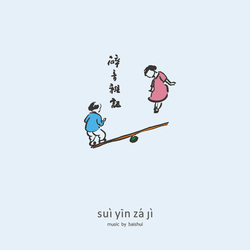
Sichuan-based musician Baishui’s ninth album, Diary of Broken Sounds, follows quickly on the release of his first full-length soundtrack album, Einstein and Einstein. Both albums, though quite distinct, remain important signposts on the road to understanding the artist’s perpetual search for the optimal form of artistic expression.
If Einstein’s overall feel is a heavy yang, Diary goes yin with a lighter, yet still full, sound. Though electronics are an essential part of Diary, the feeling is distinctly unplugged, in stark contrast to recent forrays into post-rock and experimental music. Diary, in short, takes a minimalist approach to the artist’s very maximalist goal: the pursuit of a new music—“Baishui Music”—with an Eastern core.
Chimes and flutes float playfully across wide-open expanses; static-like sounds pierce the bed created by carefully-plucked strings evoking both old-time blues and new-age soundscape with an overall ambient-world-music vibe that is equal parts meditative and playful. For brief moments, the listener is rewarded with the haunting vocals of long-time collaborator Yuan Tian, transporting both music and audience to points far above ground and back in time.
Diary is the artist’s journey—and, as listeners, we are along for the ride—through a freshly-carved yet still-to-be-fully-mapped-out terrain: “Baishui Music.”
words by jonathan campbell
Buy on iTunes or bandcamp
If Einstein’s overall feel is a heavy yang, Diary goes yin with a lighter, yet still full, sound. Though electronics are an essential part of Diary, the feeling is distinctly unplugged, in stark contrast to recent forrays into post-rock and experimental music. Diary, in short, takes a minimalist approach to the artist’s very maximalist goal: the pursuit of a new music—“Baishui Music”—with an Eastern core.
Chimes and flutes float playfully across wide-open expanses; static-like sounds pierce the bed created by carefully-plucked strings evoking both old-time blues and new-age soundscape with an overall ambient-world-music vibe that is equal parts meditative and playful. For brief moments, the listener is rewarded with the haunting vocals of long-time collaborator Yuan Tian, transporting both music and audience to points far above ground and back in time.
Diary is the artist’s journey—and, as listeners, we are along for the ride—through a freshly-carved yet still-to-be-fully-mapped-out terrain: “Baishui Music.”
words by jonathan campbell
Buy on iTunes or bandcamp
Soundtracks for The Film Einstein and Einstein
October 24,2013
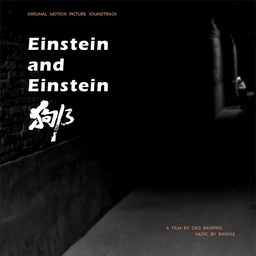
The release of Baishui's soundtrack to director Cao Baoping’s Einstein and Einstein. The film, which one review called “a searing generational indictment,” just saw its world premiere at the Busan International Film Festival, and is about a thirteen year-old girl’s relationship with her estranged father. Baishui’s soundtrack, which ranges from subtle solo piano to haunting electronic-fuelled gothic soundscapes and everywhere in between, is now available for sale on Bandcamp and iTunes.
A Film by Cao Baoping
Music by Baishui
All Instruments and Sound Effect by Baishui & Luo Keju
Vocal & Cover Designed by Yuan Tian
A Film by Cao Baoping
Music by Baishui
All Instruments and Sound Effect by Baishui & Luo Keju
Vocal & Cover Designed by Yuan Tian
New Song "Erya" is Updated
July 30,2013
Download all of Baishui's albums on iTunes
July 5,2013
Time download
Winter download
Rain Comes download
Host of a Building Named Flower Terrace Temple download
A Travel Book download
Some Other Place download
City Of Lost downloadEinstein and Einstein download
suì yīn zá jì download
Winter download
Rain Comes download
Host of a Building Named Flower Terrace Temple download
A Travel Book download
Some Other Place download
City Of Lost downloadEinstein and Einstein download
suì yīn zá jì download
The Now Sound of Sichuan: Baishui in the USA
March 26,2013
South by Southwest (SXSW), that massive music industry gathering that sees thousands of artists, industry folks and onlookers descend upon Austin, Texas, is over. Followers of this blog know that your humble narrator was along for the ride with Yibin, Sichuan native Baishui, to help bring his unique brand of prog-, goth-, experimental- and folk- (neo- and traditional) tinged rock to the Texan masses. A showcase, some parties and a fair bit of BBQ was taken in, and now, Baishui – the individual and the band he leads under his name – heads further afield. DC-, NYC- and San Francisco-based folks should take note…
Baishui creates a unique combination of traditional Sichuanese folk, experimental and cinematic soundscapes and post-rock. Fresh off a stint blowing minds at SXSW and across Austin, TX, Baishui rolls intoWashington DC, New York City and San Francisco for gigs over the coming two weeks.
BAISHUI IN THE USA DETAILS
Washington, DC
WEDNESDAY, APRIL 3, 5pm
Georgetown University, Edward B. Bunn, S.J. Intercultural Center, McGhee Library (37th and O St. N.W.)
Event details here
New York City
THURSDAY, APRIL 4, 2013, 9pm
Ran Tea House
269 Kent Ave, Brooklyn, New York 11211
Facebookers should join up here
FRIDAY, APRIL 5, 2013, 9pm
China Institute
An evening of music & conversation with Baishui
125 East 65th Street, New York, NY 10065 212.744.8181
Event details here
San Francisco
SATURDAY, APRIL 13, 2013, 9pm
Quiet Night at the Vortex Room
1082 Howard, near 7th Street
Ftg Baishui, Tin Sandwich, DJ/host Neil Martinson spinning Mellow Psych, Progressive Rock, Gentle Soul, Space Music, Pillowy Pop, and others TBA
Words by Jonathan w Campbell
Baishui creates a unique combination of traditional Sichuanese folk, experimental and cinematic soundscapes and post-rock. Fresh off a stint blowing minds at SXSW and across Austin, TX, Baishui rolls intoWashington DC, New York City and San Francisco for gigs over the coming two weeks.
BAISHUI IN THE USA DETAILS
Washington, DC
WEDNESDAY, APRIL 3, 5pm
Georgetown University, Edward B. Bunn, S.J. Intercultural Center, McGhee Library (37th and O St. N.W.)
Event details here
New York City
THURSDAY, APRIL 4, 2013, 9pm
Ran Tea House
269 Kent Ave, Brooklyn, New York 11211
Facebookers should join up here
FRIDAY, APRIL 5, 2013, 9pm
China Institute
An evening of music & conversation with Baishui
125 East 65th Street, New York, NY 10065 212.744.8181
Event details here
San Francisco
SATURDAY, APRIL 13, 2013, 9pm
Quiet Night at the Vortex Room
1082 Howard, near 7th Street
Ftg Baishui, Tin Sandwich, DJ/host Neil Martinson spinning Mellow Psych, Progressive Rock, Gentle Soul, Space Music, Pillowy Pop, and others TBA
Words by Jonathan w Campbell
Welcome to the City Of Lost
December 20,2012
With an impressive catalogue spanning neo-folk through cinematic post-rock, Baishui has established himself as a unique figure in the Chinese indie music scene. An open-minded artist, he is inspired by genres ranging from modern jazz to progressive-rock and minimal electronic, going far beyond the Southwestern-Chinese-balladeer of his early years. A Travel Book, his 2011 release, was his first foray into experimental instrumental music, and his latest work, City of Lost, continues on that path, fully shedding his neo-folk identity, and cultivating new musical territory.
Each movement of City of Lost is connected by an overall progressive-rock texture which retains, at its core, Eastern musical themes that span beyond his native China into India and the Middle East. Though different musical threads are woven through the various pieces on the album, they remain, in essence, instantly recognisable as products of the unique musical mind of Baishui.
While certainly more challenging than Baishui’s previous work, City of Lost showcases an essential element of his previous work: the ability to speak to listeners of various backgrounds with music that seems unfamiliar. Indeed, by employing instrumental music rather than, as he has in the past, singing in his own local Sichuanese dialect, City of Lost truly transcends language, speaking even more directly to the listener.
music by baishui
all instruments and sound by baishui
with luo keju bass for part.1,2,4,5
with chen ran drums for part.1,4,5
with gudao guitar for prat.1,5
Each movement of City of Lost is connected by an overall progressive-rock texture which retains, at its core, Eastern musical themes that span beyond his native China into India and the Middle East. Though different musical threads are woven through the various pieces on the album, they remain, in essence, instantly recognisable as products of the unique musical mind of Baishui.
While certainly more challenging than Baishui’s previous work, City of Lost showcases an essential element of his previous work: the ability to speak to listeners of various backgrounds with music that seems unfamiliar. Indeed, by employing instrumental music rather than, as he has in the past, singing in his own local Sichuanese dialect, City of Lost truly transcends language, speaking even more directly to the listener.
music by baishui
all instruments and sound by baishui
with luo keju bass for part.1,2,4,5
with chen ran drums for part.1,4,5
with gudao guitar for prat.1,5
